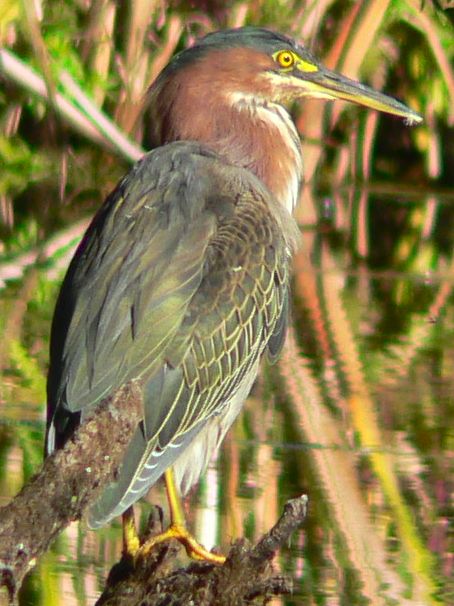|
| Query: Black back | Result: 278th of 1144 | |
Green Heron (Butorides virescens) - Wiki
| Subject: | Green Heron (Butorides virescens) - Wiki
| |

| Resolution: 454x606
File Size: 60738 Bytes
Upload Date: 2007:08:13 11:05:12
|
ERROR : Server Busy(-1105)
ERROR : Server Busy(-1105)
Green Heron (Butorides virescens) - Wiki
Green Heron
From Wikipedia, the free encyclopedia
[Photo] Green Heron (Butorides virescens). Date 2006-10-11. Author Walter Siegmund http://en.wikipedia.org/wiki/User_talk:Wsiegmund
The Green Heron (Butorides virescens) is a small heron. Some sources consider this bird and the Striated Heron or Mangrove Heron, Butorides striatus, of tropical Africa and Asia, to be a single species, the Green-backed Heron.
Description
The green heron is relatively small; adult body length is about 44 cm. The neck is often pulled in tight against the body.[1] Adults have a glossy, greenish-black cap, a greenish back and wings that are grey-black grading into green or blue, a chestnut neck with a white line down the front, grey underparts and short yellow legs. The bill is dark with a long, sharp point. Female adults tend to be smaller than males, and have duller and lighter plumage, particularly in the breeding season. Juveniles are duller, with the head sides, neck and underparts streaked brown and white, tan-splotched back, and greenish-yellow legs.
Habitat
Their breeding habitat is small wetlands in eastern and midwest North America, Central America, the West Indies and the Pacific coast of Canada and the United States. They nest in a platform of sticks often in shrubs or trees, sometimes on the ground, often near water. The female lays 3 to 5 eggs. Both parents incubate for about 20 days until hatching, and feed the young birds which take a further 3 weeks to fledge.
Northern Green Heron populations of the race B. v. virescens are migratory and winter from the southern United States through to northern South America. This subspecies is an extremely rare vagrant to western Europe.
Resident breeding birds in the Caribbean and Central America belong to the shorter-winged race B. v. maculatus
Behavior
Green Herons stand very still on shore or in shallow water and await prey. They mainly eat small fish, frogs and aquatic insects. They sometimes drop food, insects, or other small objects on the water's surface to attract fish, making them one of the few known tool-using species.[2] Feeding is done during the day. Their call is a loud and sudden kyow.
Green herons are seasonally monogamous. Nests are constructed in forest and swamp patches, over water or in plants near water. Locations in trees are preferred, with nests built up to 20 m off the ground. The clutch is 2 to 4 eggs, which are laid in 2-day intervals. The chicks are fed by both parents, though the frequency of feedings decreases as they become more independent. When chicks are 16 to 17 days old, fledging occurs, and they become independent after 30 to 35 days.
http://en.wikipedia.org/wiki/Green_Heron
| The text in this page is based on the copyrighted Wikipedia article shown in above URL. It is used under the GNU Free Documentation License. You may redistribute it, verbatim or modified, providing that you comply with the terms of the GFDL. |
|
Comments |
|---|
| | beställ cialis |
|
| 2Tb2o2 vgtsqkry vzarxldu ryqumpxp |
^o^
Animal Pictures Archive for smart phones
^o^
|
|
|